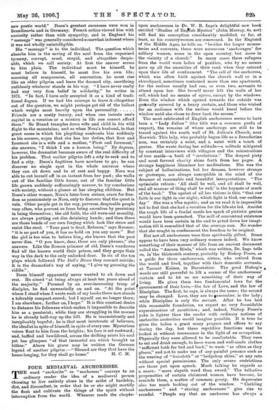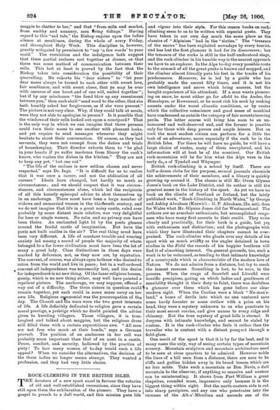FOUR MEDIAEVAL ANCHORESSES.
THE word "anchorite" or "anchoress" conveys to an ordinary reader the idea of a mediaeval person choosing to live entirely alone in the midst of hardship, dirt, and discomfort, in order that he or she might mortify the flesh and cultivate the things of -the spirit without interruption from the world. Whoever reads the chapter
upon anchoresses in Dr. W. R. Inge's delightful new book entitled "Studies of Engflish Mystics" (John Murray, 6s. net) will find his conception considerably modified, so far, at least, as his countrywomen are concerned. In the England of the Middle Ages, he tells us, "besides the larger monas- teries and convents, there were numerous ' anchorages' for solitary women, some in the open country, but more in the vicinity of a church." In many cases these refugees from the world were ladies of position, who by no means gave up all the amenities of their rank when they entered upon their life of confinement. "The cell of the anchoress, which was often built against the church wall or in a churchyard, sometimes contained more than one apartment, for the recluse usually had one, or even two, servants to attend upon her. She herself never left the walls of her cell, which had no means of egress, except by the windows. Even the window which opened towards the outside was generally covered by a heavy curtain, and those who wished for an audience with the recluse would kneel before the window until she chose to draw back the screen."
The most celebrated of English anchoresses seems to have been a "Lady Julian" (the title was a common prefix of respect), the remains of whose anchorage are still to be traced against the south wall of St. Julian's Church, near Norwich. This lady, who probably began life as a Benedictine nun, was certainly a saint, and a saint with a touch of genius. She wrote during her solitude—a solitude mitigated by constant interviews with villagers and the ministrations of two maids—a book of " revelations." The deepest piety and most fervent charity shine forth from her pages. A strange happiness illumines her meditations. She was the subject of hallucinations, but her dreams, however strange or grotesque, are always susceptible in the mind of the dreamer of reasonable and beautiful interpretations. " The optimistic refrain : 'All shall be well, and all shall be well, and all manner of thing shall be well,' is the keynote of much of the book." The upshot of all her visions is this, "that our faith is our light in our night; which light is God, our endless day." She was a due mystic; and as we read it is impossible not to feel that she had a vocation for the life she led. Amidst the rough life of a feudal castle her spark of pietistic genius would have been quenched. The mill of conventual existence would have been certain in the end to grind down her imagi- nation till it resembled that of the average nun. No wonder that she sought in confinement the freedom to be original.
But not all anchoresses were thus spiritually gifted. Some appear to have been very ordinary women indeed. We know something of their manner of life from an ancient document called the " Ancren Riwle," which was written, Dr. Inge tells us, in'the thirteenth century, probably by Bishop Poore, as a guide for three anchoresses, sisters, who retired from the world and lived, together with their domestic servants, at Tarrant Baines, in Dorsetshire. The good Bishop's • words are still powerful to lift a corner of the anchoresses curtain and to let us see something of their way of living. He gives them two fundamental laws for the government of their lives,—the law of Love, and the law of Discipline. The first, he says, is always the same; the second may be changed. Love, they are to 1emember, is the lady; while Discipline is only the servant. After he has laid this reasonable foundation, we expect no very formidable superstructure of asceticism ; and, indeed, Bishop Poore's yoke is lighter than the reader with ordinary notions of anchoritic austerities would imagine possible. It is true he gives the ladies a great many prayers and officer; to say during the day, but these repetitive functions may be looked at without irreverence in the light of an occupation. Physically they were allowed to be comfortable. They were to eat and drink enough, to have warm and well-made clothes "sufficient both for bed and back," to wash "as often as they please," and not to make use of any painful penance such as the wearing of " haircloth " or " hedgehog skins," at any rate without special permissions. The only severe restrictions are those put upon speech. Much talking he regards as a snare : "more slayeth word than sword." The talkative propensities of certain cloistered women have become, he reminds them, a matter of common gossip. He deprecates also too much looking out of the window. " Cackling anchoresses " and " staring anchoresses " give rise to scandal. "People say that an anchoress has always a magpie to chatter taller," and that "from mile and market, from smithy and nunnery, men ring tidings." Having regard to this "sad tale," the Bishop enjoins upon the ladies silence at mealtimes, during the whole of every Friday, and throughout Holy Week. This discipline is, however, greatly mitigated by permission to "say 'a few words' to-your maid." The restriction and the indulgence both suggest that these partial recluses met together at dinner, or that there was some method of communication between their cells. This last at least is proved by the fact , that - the Bishop takes into consideration the possibility of their quarrelling. He exhorts his "dear sisters" to • "let your dear noses always be turned to each other with sweet love, fair semblance, and with sweet cheer, that ye may be ever with oneness of one heart and of one will, united together"; but if by any mischance "the fiend blow up any resentment between you," then each shall " send word to the other, that she bath humbly asked her forgiveness, as if she were present." The picture is not very clear. Why, if they could talk at meals, were they not able to apologise in person ? Is it possible that the windows of their cells looked out upon a courtyard ? That is the only way in which we can imagine that three persons could turn their noses to one another with pleasant looks, and yet require to send messages whenever they might hesitate to shout their conversation. Of course, as they had servants, they were not exempt . from the duties and trials of housekeeping. Their director exhorts them to " be glad in, your hearts if ye suffer insolence from Slurry the cook's knave, who washes the dishes in the kitchen." They are not to keep any pet, " but one cat."
" The life of the recluse is -now seldom chosen and never respected," says Dr. Inge. "It is difficult for us to realise that it was once a career, and not the abdication of all careers." Ideals have changed, but hardly so much as circumstances ; and we should suspect that it was circum- stances, and circumstances alone, which led the recipients of all this homely episcopal advice to shut themselves up in an anchorage. There must have been a large number •of widows and unmarried women in the thirteenth century, and we do not imagine that life in a great noisy castle, ruled over probably by some distant male relative, was very delightful for lone or single women. • No calm and no privacy can have been theirs. An enchanted light lit by the poets gleams around the feudal castle of imagination. But have the poets net built castles in the air? The real thing must have been very different. A life of constant trouble and wearing anxiety led among a crowd of people the majority of-whom belonged to a far lower civilisation must have been the lot of Many a great ,lady. Class distinctions in those days were marked by deference, not, as they now are, by sepalution. The convent, of .course, was always open to those who desired to retire from the world and live in peace ; but in a. well-ordered
S convent -all independence was necessarily lost, and the desire for independence is no new.thing. Of the laxer religious houses, gossip, which is no new thing either, may well have painted a repellent picture. The anchorage, we may suppose, offered a way out of a difficulty. The three sisters, in question could remain -together, yet each could in some sense carry on her own. life. Religious cermonial was the preoccupation of the day. The Church and The wars were the two great interests of life. A life definitely dedicated to religion gave a certain moral prestige, a pristige.which no .doubt .pointed the advice given to kneeling villagers. , Those villagers, it is true, laughed and talked about magpies, but the religious dress still filled them with a certain superstitious awe. "All men are not free, who mock at their bonds," says a German proverb. The position of an anchoress in her cell was probably more important than that of an aunt in a castle. Peace, comfort, and security, hallowed by the practice of piety ! To how many women of to-day would such a life appeal ? When we consider the alternatives, the decision of the three ladies no longer seems strange. They wanted a profession, and they had very little choice.











































 Previous page
Previous page